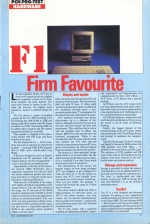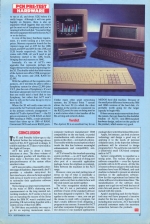
Personal Computer News
 1st September 1984
1st September 1984
Author: Ian Scales
Published in Personal Computer News #076
Ian Scales wonders if ACT will take over the Apple/IBM dominated market with a new range of Apricot-compatible micros.
ACT Spreads Its Branches

Ian Scales wonders if ACT will take over the Apple/IBM dominated market with a new range of Apricot-compatible micros
ACT is the Birmingham-based company which expanded from its base as a software house and provider of bureau services to enter the micro market.
In 1982, ACT successfully launched the US-designed Sirius. This particular success story owes its origins to one of those happy intersections of time and place - the place was the UK and the time was the era before the UK launch of the IBM PC.
It's fair to say that the runaway success of the ACT Sirius was due as much to the lack of competition as to the impressive features of the machine.
As it turned out, the Sirius was a non-standard MSDOS machine with features such as variable-speed disk drives which enabled more bits to be put on a floppy. At the time (mid-1982) the Sirius specifications looked particularly nifty. Sirius - or at least Chuck Peddle, the brain behind the product - proclaimed it the first of the fourth generation micros (whatever that means) and in those days, before all things 16-bit were measured in terms of how well they could run the Microsoft Flight Simulation program, it was hailed as a winner.
With a good-zied user base behind it, ACT decided to produce its own MSDOS machine in 1983. Perhaps in deference to a certain US company which was also attempting to stem the IBM tide, the machine was called Apricot - a fruit known to the Greeks as the 'golden apple'.
Now, a year later, ACT has announced a range of products to complement the original Apricot - there is a portable Apricot, an entry-level Apricot and a range of networking/multi-user systems and devices. All the products are software compatible.
This article was converted to a web page from the following pages of Personal Computer News #076.





